Felix Mendelsohn
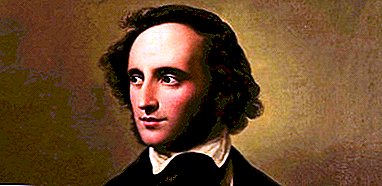
Jacob Ludwig Felix Mendelssohn-Bartholdy is an outstanding German composer who also became famous as a virtuoso pianist, a talented teacher and conductor. He is considered the largest representative of the romantic trend in classical music. In addition, Mendelssohn founded the Leipzig Conservatory and became its first leader. The composer has lived a long life, but left behind a rich artistic heritage, including the popular Violin Concerto in E Minor and Overture to the play "Midsummer Night's Dream", in addition, his famous "Wedding March" has always become the number one hit. However, Mendelssohn has one more merit for which the whole of humanity is immensely grateful. He re-opened the world to the forgotten by the time the work of the great Johann Sebastian Bach.
A brief biography of Felix Mendelssohn and many interesting facts about the composer can be found on our page.
Short biography of Mendelssohn
Felix Mendelssohn was born February 3, 1809 in Hamburg in a wealthy and influential family of a Jewish banker. His father was Abraham Mendelsohn, and his grandfather Moses Mendelssohn, the founder of the Jewish Enlightenment movement, the philosopher and preacher of the idea of religious tolerance. A couple of years after the birth of the boy, his family turned to Lutheranism, after this event a second name was added to the main family name - Bartholdi. From an early age Felix was brought up in a supportive environment that promotes education, created for children by their loving parents. He received an excellent versatile education, had the opportunity to communicate with famous intellectuals, the house was often visited by an outstanding philosopher of our time, Friedrich Hegel, and the musician Karl Zelter.
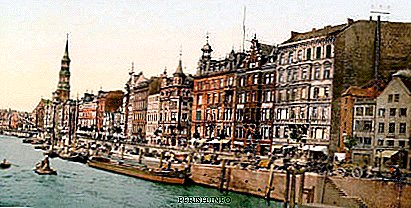
Mom of little Felix was the first to notice the propensity for music of the future composer and his sister Fanny. It was she who became their first teachers, instilled in children a sense of beauty and laid the foundations of musical notation. When Leah realized that she had given everything she could, she gave her children to study for the outstanding Berlin music teacher Ludwig Berger. Zelter himself was engaged in the theory with them. The boy also wanted to learn the violin, in which first-class teachers also helped him, and then switched to viola, which in the future will become his favorite musical instrument.
According to the biography of Mendelssohn, at the age of 9, Felix first performed in public as a pianist, and only a year later won the audience with his vocal abilities. At the same time, his early compositions appear: sonatas for violin and piano, organ compositions. Heinrich Heine already then called the young talent "musical miracle." At the same time, the composer with all the might is engaged in concert performances, appears to the public as a conductor and performer not only of strangers, but also of his own works, and in 1824 his first independent opera Two Nephews was played on stage.
Creativity Mendelssohn
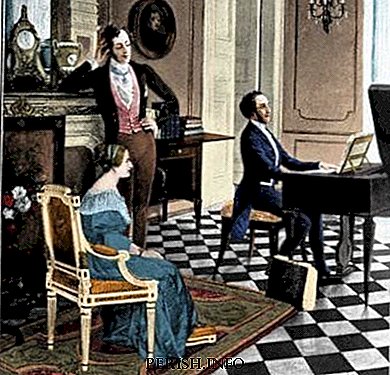
In addition to education and communication with the smartest people of that era, travel has always influenced the work and views of Mendelssohn. Parents always tried to show the boy the light, and when he was 16 years old, his father Abraham took him on a business trip to Paris.
At that time, the city was considered the cultural center of Europe; famous composers, Rossini and Meyerber, lived and worked in it. The head of the Paris Conservatoire gave the highest rating to his success, but at Mendelssohn himself, the French musical traditions did not make much of an impression. This is evidenced by his personal correspondence with friends and records of his sister Fanny. Nevertheless, Felix managed to make useful contacts in the high society of creative intelligentsia.
Mendelssohn returned to Berlin at the end of the same year. The young man re-sent to Goethe and his guest for the first time performs a concert for him dedicated to the piano. In August 1825, he completed work on his first serious work - an opera in two parts, The Wedding of Camacho based on Don Quixote.
Biography of Mendelssohn says that in the summer of 1826, in a matter of weeks, the composer wrote one of his most recognizable creations - the Overture to Shakespeare's comedy "A Midsummer Night's Dream". 12 minutes of the composition opens to the listener a wonderful world full of slightly naive youthful dreams. In 1827, for the first time, the stage interpretation of the Camacho Weddings was planned. The audience accepted the premiere of the performance warmly, the opera deserved good reviews from critics, but because of the constant backstage intrigues and intricacies, the second production was disrupted. Mendelssohn was so disappointed in his creation, that he never gave up writing operas, but focused his attention on instrumental works. In the same year, a young musician is admitted to the Humboldt University of Berlin, where he listens to lectures by one of his very first teachers, Friedrich Hegel.
From an early age, Mendelssohn became interested in the work of the undeservedly forgotten at that time. I.S. Baha. Even in childhood, the grandmother of the boy presented him a manuscript "Matthew's Passion", and Zachter gave him notebooks with Bach's compositions as a textbook in the classroom. Later, in 1829, under the guidance of Mendelssohn, the audience again heard" Matthew Passion "and this event went down in the history of music.
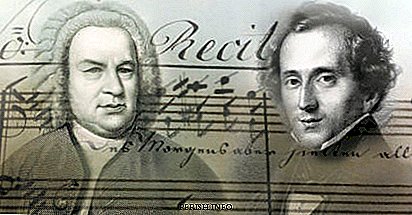
Concert activity
In the wake of the success of the show "Matthew Passion", Mendelssohn is going to London for the first time on a concert tour. Here he repeatedly performs with his orchestral works, which has become the famous and recognizable overture to "Midsummer Night's Dream", and also performs the favorite works of Beethoven and Weber. The concerts of the musician are so popular that, following London, he goes to conquer Scotland, later, being under the indelible emotions of the trip, he will write the Scottish symphony. Home to Berlin, Mendelssohn arrives star of European magnitude.
A visit to England was only the beginning of the composer’s touring activities sponsored by his father, after which he was sent to conquer Italy, and on the way he visited Goethe. In 1830, Mendelssohn received a proposal to take a vacant position at the University of Berlin, where he previously studied, but he rejects it in favor of the tour.
All summer of 1830 flies on the road: Munich, Paris, Salzburg. In Rome, the composer remains until the end of winter, where he works on the introduction to the Hebride and writes notes to the First Walpurgis Night. The way home in the spring of 1831 runs again through Munich, where Mendelssohn gives a whole range of piano concertos. He is all immersed in a passionate feeling for the beautiful Dolphin von Shaurot, he dedicates her new clavier concert to her, hastily writes it on a piece of paper and performs in front of the King of Bavaria.
Incredible success of Mendelssohn
At the age of 26, Felix Mendelssohn becomes the youngest leader of Gewandhaus. He immediately finds a common language with the orchestra, he manages to curb and customize musicians who don’t even notice. Concerts in Gewandhaus under the leadership of Mendelssohn quickly become Europe-wide, and the composer himself becomes a prominent person. In Leipzig, Mendelssohn has time to work only during the holidays, that's when he finishes a triptych on the religious theme “Elia - Paul - Christ”, conceived in the Düsseldorf period.
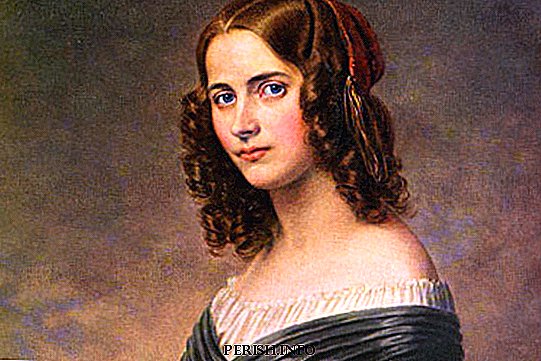
Shortly after the death of his father, Felix’s mother takes a promise from him to find a suitable wife, and in the autumn of 1836 he is married to a girl from a well-to-do family, Cecilia Jean-Renault. In family life, Mendelssohn gained long-awaited harmony. His wife did not have a special mind, but she was caring and economic, moreover, he had repeatedly stated that highly educated ladies from high society were deeply disgusting to him. Five children were born in the marriage, and Mendelssohn, inspired by life, scooped new creative ideas from his family happiness. In 1840, he applied for the establishment of the first conservatory in Germany in Leipzig, which was then founded three years later.
In 1841, King of Prussia Friedrich Wilhelm IV summoned Mendelssohn to Berlin, who, according to his idea, was destined to become the main musical center of all Germany. He instructs the composer to engage in the reform of the Royal Academy of Arts. Mendelssohn resolutely gets down to business, but his activity stumbles upon such a fierce rebuff from the Berlin creative intelligentsia that he abandons his attempts and leaves Berlin.
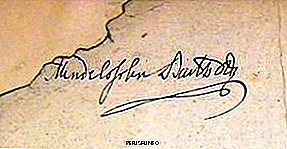
The last period of the life and work of Felix Mendelssohn
In 1845, the king of Saxony convinces Mendelssohn to return to Leipzig. He again takes the lead of the Gewandhaus Orchestra and retains this post for the time remaining to him. In 1846 he finished his work on the oratoria "Elia" and presented it to the audience in Birmingham. Later, in his letters to his brother, he would write that the works he had never created had such success as the premiere of "Elia." For several hours in a row, while the concert lasted, the audience sat still without stirring, being in constant tension.
After the end of the tour, he proceeds to the third part - "Christ", but the composer brings health, and he is forced to interrupt work. The musician is partly tormented by bouts of bad mood and an ever-increasing headache, so the family doctor prohibits him from touring. In October 1847, he suffered a stroke, and immediately after him on November 3, the second. November 4, 1847 in the early morning on the 39th year of the life of the composer Felix Mendelssohn was gone. Until his last breath, his beloved wife Cecilia was next to him.
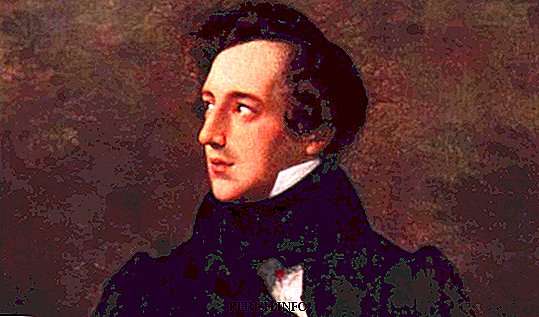
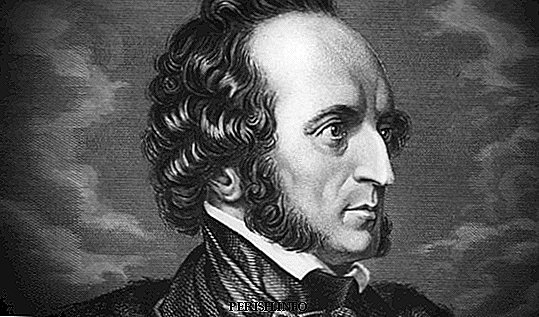
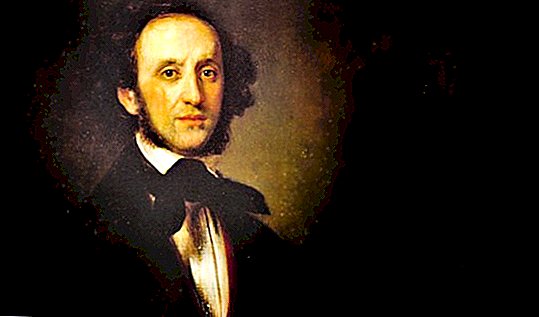
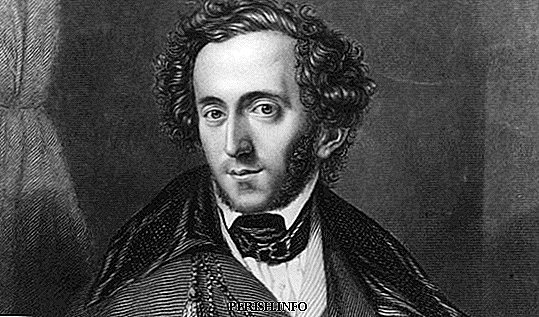
Interesting facts about Felix Mendelssohn
- In 1821, the theory teacher Zelter introduced Mendelssohn to the famous Goethe, who reacted very positively to the writings of the budding musician and later became his senior comrade and mentor.
- In addition to his penchant for music, Mendelssohn loved to draw. He was fluent in pencil and watercolor, he often supplied his letters to friends and relatives with drawings and humorous notes, which testified to the sharpness of his mind and cheerful disposition.
- On May 11, 1829, the first performance of Matthew's Passion, led by Mendelssohn, was held at the Berlin Singing Academy. The impression that caused the work was so powerful that the Academy decided to annually include it in the repertoire. It was after this speech that the Bach movement of the 19th century was reborn, and Mendelssohn received worldwide recognition.
- At a time when Mendelssohn assumed the leadership of the Leipzig Gevandhaus, he received many proposals for including in the concert program works of talented young and already experienced composers. One of those who offered his works was Richard Wagner with his early Symphony. To his indignation, Mendelssohn lost his job. This can explain Wagner’s strong dislike for the composer and his harsh criticism after the latter’s death.
- According to the father of Abraham, it was the eldest daughter Fanny who presented the greatest hopes musically. However, at that time it was considered unthinkable for a woman to make a musical career. Fanny remained a talented but unprofessional composer.
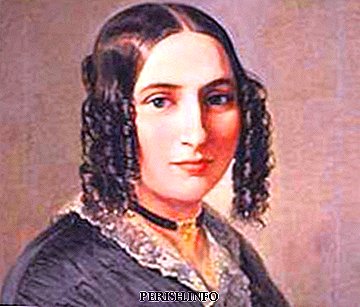
- During his tour in Paris, Mendelssohn presented to the public "The Reformation Symphony", which failed at the rehearsal stage with the orchestra. This event was the first serious creative disappointment, after which Mendelssohn was deeply wounded.
- After a successful performance in London, Mendelssohn received a very profitable proposal to take the place of the chief conductor of the Rhine Festival in Düsseldorf. And in 1835, after performing at the Cologne Music Festival, he received an offer to take the post of the head of the Gewandhaus Symphony Orchestra in Leipzig and immediately accepted it.
- From the biography of Mendelssohn, we learn that in 1836 the composer received the title of Doctor of Philosophy.
- The image of Mendelssohn is often idealized, describing him as an exemplary family man and calm person. The letters of his nephew demolish this image, he reports that the composer was subject to drastic mood swings, sometimes he fell into a gloomy state or began to mumble incoherently. It is possible that this behavior gradually led to a deterioration in health and resulted in death at an early age.
- All the children of Mendelssohn, except the second oldest, who died from a long illness, lived long lives and became respected representatives of science, culture and art. Cecilia's wife outlived her beloved husband by only six incomplete years.
- Many years after the composer's death, it turned out that he could not have been such a faithful spouse for his wife, as it was considered to be. In the documents, which allegedly exist, but were never presented to the public, it is stated that Mendelssohn had a deep emotional connection with Swedish singer Jenny Lind. It is curious that the famous storyteller Hans Christian Andersen was also in love with her. In letters to her beloved, Felix Mendelssohn allegedly prayed for her dates and threatened her if she refused to commit suicide. After the appearance of such rumors, doubts arose that the death of the composer was due to natural causes.
- On May 17, 1847, Mendelssohn received the most terrible blow, which he was no longer able to survive due to the deteriorated mental health - at the age of only 42 years his soulmate, his beloved older sister Fanny, dies from the blow. After the death of both parents, it was she who personified his relationship with his family, and after her death, the composer, in his own words, lost his “I”.

- Under the Nazi regime during the Second World War, the name of Mendelssohn, a Jew by birth, was removed from the pages of the history of German music, and a monument erected in front of the Leipzig Conservatory building was demolished and sold for metal.
- During the lifetime of the composer's reputation was very high. He was respected by colleagues and students. However, after the death of Mendelssohn, Richard Wagner, who called the musician's works "senseless strumming", came down on all his work with harsh criticism. He blames him for the senseless copying of the great classics, and connects the futility of his claims for genius with his Jewish origin. However, contemporaries noted more than once that Wagner was not entirely sincere in his attacks, and his true opinion often disagreed with his pompous words.
Wedding March of Mendelssohn

Not many composers can boast such a landmark and recognizable work as Mendelssohn’s “Wedding March”. If you roughly calculate how many times it has been performed for all the time in different parts of the world, then no other masterpiece of classical music can beat this record. However, the author himself did not even guess what success his creation was waiting for, and during the premiere, where this melody was performed for the first time, the public did not particularly appreciate it. It is worth noting that "Wedding March" is not an independent work, but only part of the music for Shakespeare's comedy "A Midsummer Night's Dream" and initially it did not embody the touching moment of the marriage of two loving hearts. The march sounds during the marriage of the heroes of Shakespeare, the Donkey and the magic Queen, and is nothing more than mockery and satire above the magnificent ceremonial. Marsh acquired its modern meaning after the composer's death, when the future King of Prussia Frederick III and his bride, the English princess Victoria, chose him as wedding music. The girl was very fond of music and responsibly approached the choice of works for the marriage ceremony. After going through all the samples, she chose two songs, one of which was Mendelssohn’s “Wedding March”.
Music Mendelssohn in movies
Mendelssohn's music can be found in many films and cartoons. Directors of many countries and decades often turned to the composer's works.

| Composition | Film |
| Symphony 4 Italian | "Grand Tour" (2017) |
| "Thanks for sharing" (2012) | |
| Wedding March | Velvet (2016) |
| The animated series "The Simpsons" | |
| "The Big Bang Theory" | |
| "Handsome" (2015) | |
| "The Mentalist" (2013) | |
| "Runaway Bride" (1999) | |
| Songs without words | Resistance (2011) |
| "Lewis" (2010) | |
| Once upon a Time (2007) | |
| "Show Rena and Stimpy" (1995) | |
| "Nutty" (1993) | |
| Concert for piano №1 | "Remember" (2015) |
| "Testing Kate McCall" (2013) | |
| "With or without you" (1999) | |
| Concerto for violin in E minor | "Mozart in the jungle" (2014-2015) |
Renowned composer and music critic Schumann called Mendelssohn the "Mozart of the nineteenth century," and P.I. Tchaikovsky highly appreciated his composer abilities. It's hard not to agree with this, the author of the famous "Songs without Words", "Wedding March" and many other outstanding works is known around the world, and every year the circle of admirers of his talent only grows.

Leave Your Comment